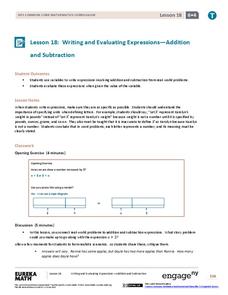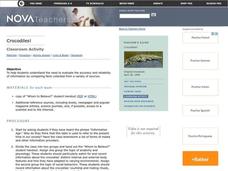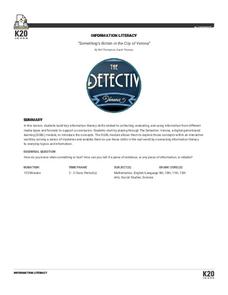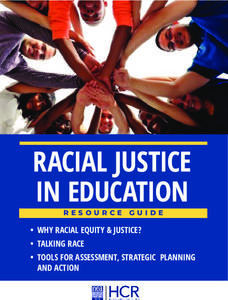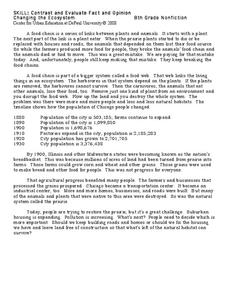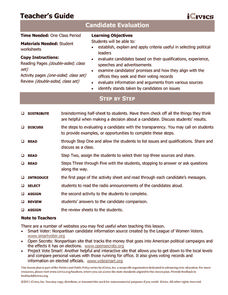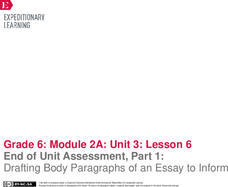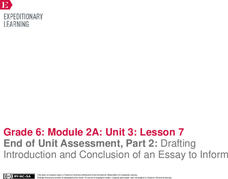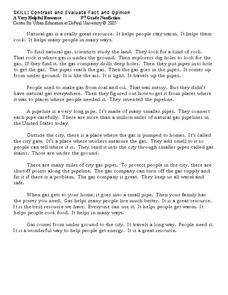EngageNY
Writing and Evaluating Expressions—Addition and Subtraction
Let Y represent Yes to using an excellent resource. Pupils first learn to define variables using a complete description in the 19th part in a series of 36. They write expressions involving addition and subtraction in real-world contexts...
Florida Center for Reading Research
Comprehension: Text Analysis, Persuade, Inform, and Entertain Sort
Why do authors write? Practice determining the author's purpose with a categorizing activity. Learners sort twelve short passages into three categories: persuade, inform, and entertain.
Curated OER
Hamlet Research Paper: Find, Evaluate, and Select Appropriate Research Sources
Help young researchers find credible sources online. Modeling with a Google search for information about Shakespeare’s Macbeth, use a computer projector or Smart Board to show class members how weak the top three search results are....
Curated OER
Crocodiles
Work on research procedures in this lesson, which prompts writers to collect and evaluate information pooled from a number of sources. They work in teams to collect information about crocodiles from different sources. They compare the...
EngageNY
Gathering Information about Screen Time: Assessing and Reading Internet Sources, Day 1
What's the best way to evaluate a source's accuracy and credibility? Pupils discuss the question with a partner and then share their ideas with the class. They also conduct Internet research, looking for an article that answers a chosen...
K20 LEARN
Something's Rotten In The City Of Verona: Information Literacy
Data is a powerful tool that your class can use for both good and evil! Help your classes become knowledgeable consumers of information through a game-based exploration. Learners examine a method of determining the reliability of a...
Ontario
Reading Informational Text
Learning to recognize the importance of the features of information text (i.e., titles, subtitles, endnotes, sidebars, etc.) is the focus of a reading activity designed for middle schoolers. Learners examine how these text features help...
Curated OER
Liberty and Security in Contemporary China
Upper graders consider contemporary Chinese economics, political viewpoints, and government. This unit covers a span of several class periods or six days, and engages learners in a variety of skills based activities. They conduct...
National Education Association
Racial Justice in Education Resource Guide
Strive for racial justice within your classroom community with help from an 80-page resource guide. Five modules move scholars through thoughtful, and reflective grand conversations to making a plan, then taking action. Learners write...
Curated OER
The Big 6
Before beginning the process of research, go through the steps necessary to procure information. "The Big 6" teaches learners to find, use, apply, and evaluate information according to their needs. Help learners not be overwhelmed by...
Curated OER
Information Problem Solving
Middle schoolers locate the specific elements of text and illustrations that communicate setting, characterization, and plot in order to evaluate how the text and illustrations work together to communicate effectively.
Curated OER
Information from Posters
Budding journalists examine and evaluate an informative poster advertising a public meeting to discuss city park issues. They write a paragraph explaining what they found to be effective and ineffective about the poster, then imagine...
PBIS World
Student Self-Evaluation Form
Here's a self-evaluation form designed to get pupils thinking about their behaviors, both the positive and the negative.
DePaul University
Contrast and Evaluate Fact and Opinion
How can you tell when an author is expression an opinion or stating a fact? Use two short reading selections to emphasize the difference between a statement that you can prove and one that you can't. The first passage explains food...
Science Matters
Renewable and Nonrenewable Resources
Did you know there are at least 12 different energy sources? Scholars apply their knowledge about the different types of energy as they sort energy sources by renewable and nonrenewable. Then they pick one from each section to explain in...
Curated OER
Strategic Skill: Evaluating Information Quality Using Electronic Sources
Fourth graders review and complete evaluating information quality. In groups, they research the diversity of the numerous Native American tribes in Montana. They complete a worksheet on evaluating sources on the Internet and share...
iCivics
Candidate Evaluation
How can we decide between candidates on election day? After contemplating various issues and qualities, your learners will go through a step-by-step process of researching and evaluating sample candidates and determining their...
EngageNY
Performance Task Preparation: Peer Critique and Mini-Lesson Addressing Common Errors: Revising Draft Essay to Inform
Time to revise! Using a writing evaluation rubric, scholars participate in a peer editing process to provide feedback on each others' informative essays. Next, pupils begin revising their drafts based on the feedback they receive.
EngageNY
End of Unit Assessment, Part 1: Drafting Body Paragraphs of an Essay to Inform
Anybody can write a body paragraph! Pupils analyze the development of ideas in a body paragraph from a model essay. Next, using what they've learned, they draft the body paragraphs of their My Rule to Live By informative essay.
College Board
Evaluating Sources: How Credible Are They?
How can learners evaluate research sources for authority, accuracy, and credibility? By completing readings, discussions, and graphic organizers, scholars learn how to properly evaluate sources to find credible information. Additionally,...
Curated OER
Savvy Surfers: Website Evaluation and Media Literacy
Sixth graders strengthen their understanding of what a high quality website is composed of. Learners evaluate three websites for accuracy, credibility, and reliability by completing a chart.
EngageNY
End of Unit Assessment, Part 2: Drafting Introduction and Conclusion of an Essay to Inform
A powerful introduction and conclusion can really pack a punch. Using the resource, scholars first read and discuss a model essay. Then, as part of the end of unit assessment, they draft the introductory and concluding paragraphs of...
Google
Advanced 5: Evaluating Credibility of Sources
How do discerning readers determine bias and credibility? Ask small groups to figure it out! First, each group is provided with either articles or videos that contain bias. They examine the resources, respond to included questions, and...
DePaul University
Contrast and Evaluate Fact and Opinion
Looking for a resource that helps learners practice identifying fact and opinion? A four-page learning exercise includes two informational text reading passages. Pupils read each passage and respond to four multiple choice and one short...


